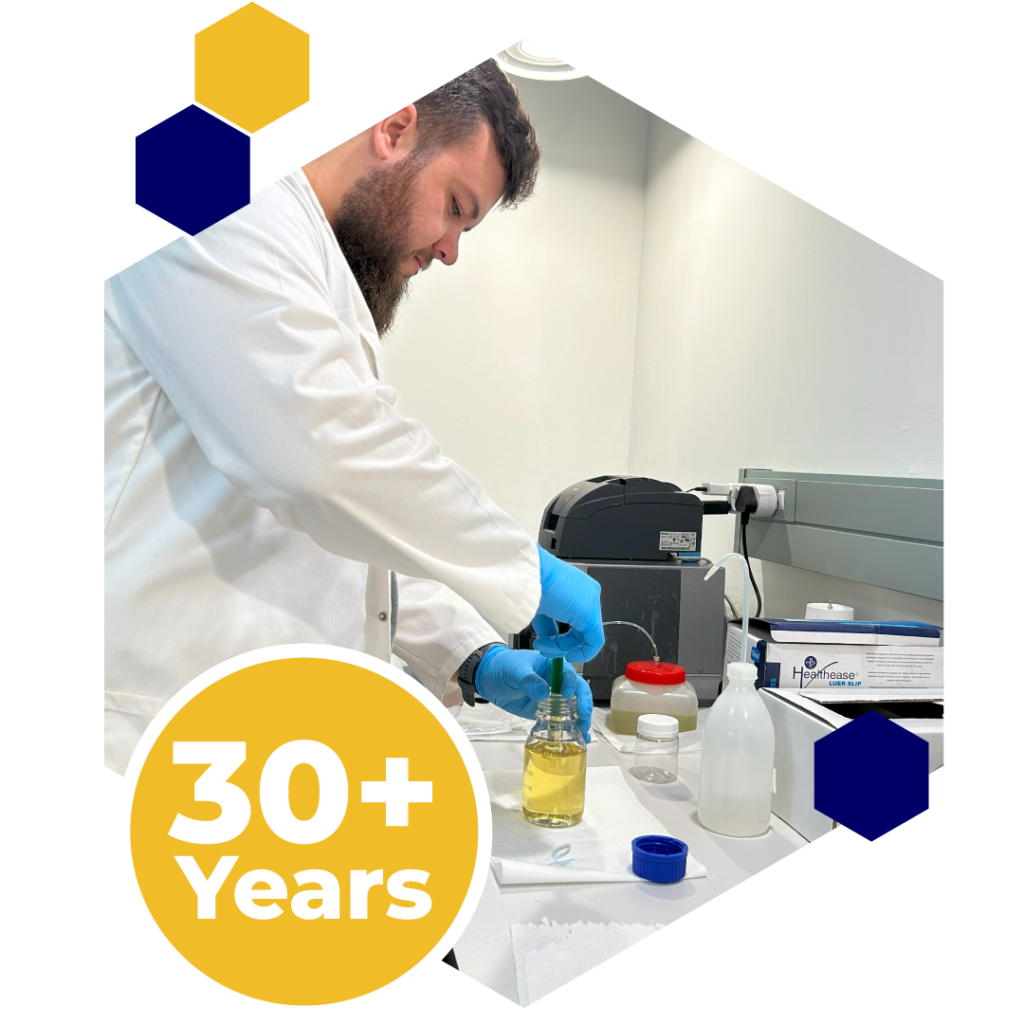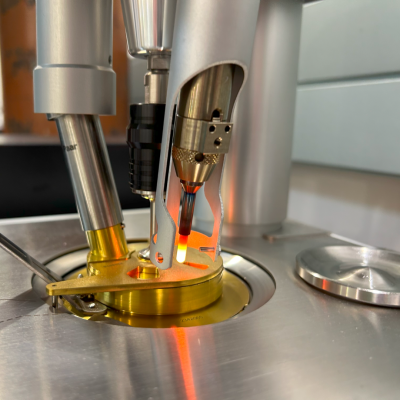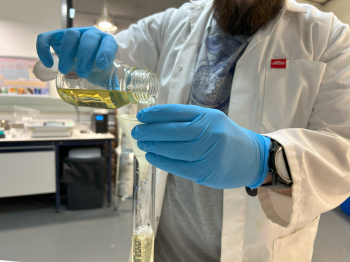
At PetroleumFix’s laboratory, we employ a range of advanced equipment, including infrared and X-ray spectrometers and viscometers, to thoroughly test various fuel types. Our experienced team ensures that tests are conducted swiftly and precisely, delivering accurate results to our clients at a rapid pace. This combination of cutting-edge technology and expertise guarantees the highest standards of fuel quality testing.
When it comes to diesel quality, the stakes are high. Poor fuel can lead to engine damage, increased operational costs, and even safety hazards. At Petroleumfix, we offer a range of laboratory tests designed to ensure that your diesel meets stringent quality standards. In this blog post, we’ll explore our services, why each test is vital, and how our pricing structure reflects the value of quality fuel.
Our basic diesel test includes four essential assessments: Flashpoint, Viscosity, Density, and a Visual Assessment. Understanding these parameters is crucial for maintaining the integrity and performance of your fuel.
The flashpoint of diesel indicates the minimum temperature at which it can ignite. For safe storage and handling, a minimum flashpoint of 55oC is required by SANS standards. A low flashpoint can signal potential adulteration with petrol, which poses a significant safety risk. Identifying low flashpoints can help you avoid dangerous contaminants.
Viscosity measures a fluid’s resistance to flow, directly impacting fuel atomization and lubrication within engines. If the viscosity is outside the SANS requirement of 2.0 – 5.3 centistokes, it can lead to increased wear on engine components, reduced fuel efficiency, and poor combustion. Identifying viscosity issues can prevent costly repairs and enhance overall engine performance.
Density reflects the energy content of diesel. Specified at a minimum of 0.800 kg/l at 20°C, low-density fuel results in reduced power and increased fuel consumption. This test also helps identify contaminants like illuminating paraffin, which have different density profiles. Ensuring proper density can optimize fuel performance and save you money in the long run.
A visual examination can reveal free water, particulate matter, and overall fuel clarity. This qualitative test is crucial; any contaminants can lead to fuel failure according to SANS 342 standards. A thorough visual assessment allows you to catch issues that may not be evident in numerical data.
The Full Diesel Test offered by PetroleumFix provides a comprehensive analysis of your diesel fuel, combining the Basic Diesel Test with additional assessments to ensure optimal performance and safety. This all-encompassing test is ideal for those who require a deeper understanding of their fuel’s quality, covering critical parameters that impact engine performance, fuel efficiency, and safety.
The flashpoint of diesel indicates the minimum temperature at which it can ignite. For safe storage and handling, a minimum flashpoint of 55oC is required by SANS standards. A low flashpoint can signal potential adulteration with petrol, which poses a significant safety risk. Identifying low flashpoints can help you avoid dangerous contaminants.
Viscosity measures a fluid’s resistance to flow, directly impacting fuel atomization and lubrication within engines. If the viscosity is outside the SANS requirement of 2.0 – 5.3 centistokes, it can lead to increased wear on engine components, reduced fuel efficiency, and poor combustion. Identifying viscosity issues can prevent costly repairs and enhance overall engine performance.
Density reflects the energy content of diesel. Specified at a minimum of 0.800 kg/l at 20oC, low-density fuel results in reduced power and increased fuel consumption. This test also helps identify contaminants like illuminating paraffin, which have different density profiles. Ensuring proper density can optimize fuel performance and save you money in the long run.
A visual examination can reveal free water, particulate matter, and overall fuel clarity. This qualitative test is crucial; any contaminants can lead to fuel failure according to SANS 342 standards. A thorough visual assessment allows you to catch issues that may not be evident in numerical data.
Sulphur content is a key indicator of fuel quality, affecting emissions and engine longevity. Low-sulphur diesel (0.005% or 50 ppm) is mandated for compliance with environmental standards. High-sulphur fuel can lead to increased emissions and engine wear. Measuring sulphur with precision is crucial for maintaining a clean and efficient fleet.
This test evaluates the volatility of diesel, indicating how well it will perform in various conditions. It measures the temperatures at which different volumes of the fuel vaporize, helping to identify any contamination issues. A consistent distillation profile ensures optimal engine starting, fuel economy, and reduced emissions.
For wholesalers and fleet operators, the risks of purchasing contaminated diesel can be significant. Some suppliers may mix diesel with illuminating paraffin (IP) to cut costs, leading to several issues:
IP has lower viscosity and lubricity, increasing wear on engine parts.
Lower density leads to higher fuel consumption.
Lower flashpoints increase the risk of fires.
High sulphur levels can result in emissions penalties.


In addition to diesel, our laboratory also tests petrol, paraffin, and biofuel. Using state-of-the-art equipment, we ensure that each fuel type meets rigorous quality standards, providing you with accurate and reliable results across the board.
At PetroleumFix, our streamlined fuel testing process ensures fast and accurate results. First, clients book a test through our easy-to-use system. They then collect a sample of their fuel (petrol, diesel, paraffin, or biofuel) in a clean, sealed bottle and bring it to our state-of-the-art laboratory. Once the sample is received, we conduct a comprehensive analysis and deliver a detailed report within 24 hours. Afterward, our expert team provides personalized advice and consultation to help clients make informed decisions about their fuel quality and performance.
The client schedules a fuel test with PetroleumFix through our convenient booking process.
Ensure you have correctly sampled your fuel in a clean and sealable container.
Deliver or send via courier to us with instructions and details. Ensure correct test will be done by confirming the order.
Fast testing will be carried out and reporting will be sent via email.
Give us a call for any further questions or explanations.
At Petroleumfix, we understand that quality fuel is crucial for your operations. Our comprehensive testing services are designed to provide you with the peace of mind that your diesel meets or exceeds quality standards. By investing in our tests, you are safeguarding your fleet, reducing long-term costs, and ensuring compliance with regulatory requirements.
Quality diesel is more than just a commodity; it’s an investment in the efficiency and safety of your operations. Whether you choose our basic diesel test or opt for specialized analyses, Petroleumfix is here to provide you with the insights you need. Don’t compromise on fuel quality—contact us today to learn more about our testing services and ensure your diesel is up to standard!